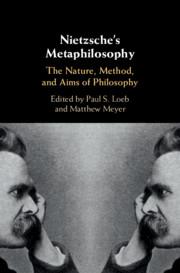Book contents
- Nietzsche’s Metaphilosophy
- Nietzsche’s Metaphilosophy
- Copyright page
- Contents
- Contributors
- Acknowledgments
- Note on Texts, Translations, and References
- Abbreviations
- Introduction
- Part I Evolving Metaphilosophies
- Part II The Nature of Philosophy
- Part III The Method of Philosophy
- Part IV The Aims of Philosophy
- Chapter 10 Nietzsche’s Aesthetic Conception of Philosophy
- Chapter 11 Metaphilosophy and Metapolitics in Nietzsche and Heidegger
- Chapter 12 Nietzsche’s Psychology of Metaphysics (or Metaphysics as Revenge)
- Chapter 13 “The Great Seriousness Begins”
- Bibliography
- Index
Chapter 11 - Metaphilosophy and Metapolitics in Nietzsche and Heidegger
from Part IV - The Aims of Philosophy
Published online by Cambridge University Press: 24 October 2019
- Nietzsche’s Metaphilosophy
- Nietzsche’s Metaphilosophy
- Copyright page
- Contents
- Contributors
- Acknowledgments
- Note on Texts, Translations, and References
- Abbreviations
- Introduction
- Part I Evolving Metaphilosophies
- Part II The Nature of Philosophy
- Part III The Method of Philosophy
- Part IV The Aims of Philosophy
- Chapter 10 Nietzsche’s Aesthetic Conception of Philosophy
- Chapter 11 Metaphilosophy and Metapolitics in Nietzsche and Heidegger
- Chapter 12 Nietzsche’s Psychology of Metaphysics (or Metaphysics as Revenge)
- Chapter 13 “The Great Seriousness Begins”
- Bibliography
- Index
Summary
The chapter discusses Nietzsche’s and Heidegger’s metaphilosophical investigations. They result in two different versions of a postmetaphysical philosophy of finitude. For Nietzsche, metaphysics puts forward ideas of the absolute and of absolute value, such as goodness or freedom per se. The qualities and qualifications that specify human beings, however, are provisional and relational, in short: finite. They are, in fact, instances of one unique force that feeds them all, viz the will to power. Even our thoughts and values seem to supervene on actual power relations. Metaphysics completely misses this point, Nietzsche argues; hence, we should abandon it. Heidegger, too, wants to dismiss metaphysics because it fails to accommodate human finitude. For him, metaphysics initially dealt with the question of the Being (Sein) of beings (Seiendes) but, unfortunately, has forgotten about Being altogether. Focusing on the understanding of beings as beings instead, metaphysics, including Nietzsche’s philosophy of power, has been occupied with fleeing from Being. Yet,for us humans, our very Being (as well as the meaning of Being in general) is always an issue about which we most deeply care, even though it entails nothing but time, transience, and, ultimately, death.
Keywords
- Type
- Chapter
- Information
- Nietzsche's MetaphilosophyThe Nature, Method, and Aims of Philosophy, pp. 207 - 226Publisher: Cambridge University PressPrint publication year: 2019
- 1
- Cited by

